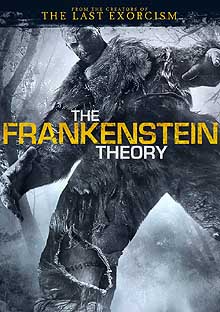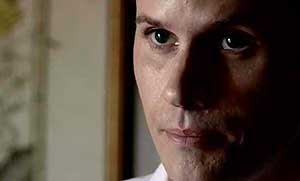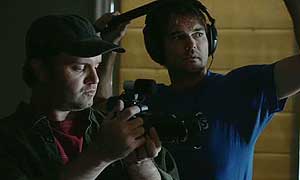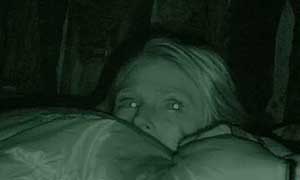 Andrew Weiner (Director 'The Frankenstein Theory')
Andrew Weiner (Director 'The Frankenstein Theory')
'It's Alive! The Big Monster Theory!'
On March 1st, Image Entertainment unleashed 'The Frankenstein Theory' (starring Kris Lemche, Heather Stephens, Joe Egender, Timothy V. Murphy, Eric Zuckerman, et al) on VOD and across the country in exclusive theatrical engagements.
Written and directed by Andrew Weiner, and from the makers of 'The Last Exorcism' comes a boldly original vision of horror: What if the most chilling novel of all time was actually based on a true account of a horrific experiment gone awry?
When he is suspended from his university job for his outlandish ideas, Professor John Venkenheim leads a documentary film crew to the rim of the Arctic Circle in a desperate effort to vindicate his academic reputation. His theory: Mary Shelley’s ghastly story, “Frankenstein,” is, in fact, a work of non-fiction disguised as fantasy.
In the vast, frozen wilderness, Venkenheim and his team search for the legendary monster, a creature mired in mystery and drenched in blood. What they find is an unspeakable truth more terrifying than any fiction…a nightmare from which there is no waking.

And so, here on the release date for the movie, I sit one-on-one with Director Andrew Weiner. With the fact that his screenplay (that he wrote with Vlady Pildysh) not only hones in on Mary Shelley’s ‘Frankenstein’ novel, but her personal life also. And being that she was a woman who came of age at the close of the Age of Enlightenment. I first wondered if he had purposely woven into the fabric of this story Victor's (and therein Professor John Venkenheim's) sense of a false optimism also? "Absolutely. And you hit the nail on the head when you talk about the Age of Enlightement. Because it was so critical to the shaping of Mary Shelley's world view. She was shaped by her parents, William Godwin and Mary Wollstonecraft who were both pillars of society. And there was, at that time that sense that man could create and shape his own destiny. And, of course, that is very much the attempt in the novel of 'Frankenstein.' The idea of replacing God and creatng life. And the hubris that one thinks that they could actually do that. And, of course, it goes horribly wrong."
"But what's interesting in looking at the novel from todays point of view verses when it was written, I think that Mary Shelley was probably very sympathetic to the character of Dr. Victor Frankenstein. Who has a lot of shadows of her own husband, Percy Bysshe Shelley. And I think when most people read her novel today they are not that sympathetic to the protaganist. Because I think he comes off as someone with a fatal arrogance. He feels very sorry for himself, but he doesn't feel too sorry for the people that die because of his own foibles."
"But it all remains interesting today. And that main character in the film, John Venkenheim is, by design, he mirrors some of those attributes; whether they're positive or negative, that Dr. Victor Frankenstein possesses."
Dr. Victor Frankenstein’s belief that the creation of such a beast of nature could actually benefit society is, of course delusional at best, but done in any other circumstances could such a creation actually provide positive repercussions and consequences, perhaps? "Well, I'm not a scientist by trade, but I really think that it's been an ongoing theme with human scientific and medical study. I mean, what is Genetic Engineering? It's there to improve the advancement of the human condition. Right now we have the ability to clone another human being. That's easy to do. It's not legal. It has moral hurdles, but there aren't technological hurdles."
"We could get probably a viable clone of you, but I don't know how you'd feel about that. Which is probably one of the reasons why there isn't the Russ clone floating around!"
I don't have any brothers or sisters, so that might be quite nice! "You could teach it to play catch, but it would throw like you! But, yes, it is an interesting question. And I think that the theme of Frankenstein, even though it's 200 years old, there are some many themes to it. It's such a rich novel. But just from a scientic background, it's completely relevant in todays world."

You shot this movie on a shoestring budget on location in Alaska, so can you tell me what turned out to be your greatest downfall out there; and what turned out to be your greatest achievement? "That's an interesting question. It's a touch place to shoot. I would say the biggest downfall is that shooting in Alaska is dangerous. Especially at that time of year. And the biggest reason is because of transportation. Driving on icy, snowy roads in the wilderness together with production vehicles that are not well equipped to drive in such conditions. The number one cause of production-related deaths are helicopter crashes. Second to vehicular accidents. So it is very dangerous and it was something I was very nervous about."
"What I hate most about making movies are the stunts. I don't hate them, they just make me incredibly nervous. Because there's always a chance for something to go wrong. And every movie that I've worked on that has involved stunts involves accidently property damage. And frequently injuries. And no movie's worth losing somebody's life over."
"And there was one location at the end that I wanted to shoot at, but I felt like the road conditions were not worth it. So I pulled the plug on that location and we shot somewhere else. And I don't think we lost anything aesthetically, but it was a tough decision. But, ultimately, the roads were very icy, it was a long drive, it was at the end of the shoot, people were tired and I just didn't think it was worth the risk."
"In terms of what went well, there's two shots that I rathe rlike; and that correspond to each other. One is in L.A. where we see the main character's girlfriend standing in the street, and she slowly disappears from view as Jonathan drives away to the airport. And it's sort of a matching shot with the last shot of the film. But I don't really want to give away the ending of the film. But they just tie in perfectly to the whole theme of alienation and being lost."
"That last shot of the film was so clear in my mind. I had ever detail of the way the last shot would be. And so when we actually shot it we really matched exactly what I set out to achieve. Because sometimes when you make a movie things turn out better or worse; different. But when they come out exactly the same as you planned and hoped, well, it's always a marvel," he gently laughs.
"Especially as in order to get that shot we were at this Yurt, this 100 year old structure ... that was actually only a couple of days old because we'd just built it! So it was myself and the Art Director who first went out sourcing the materials to build this Yurt. And then built it on this property that we had to shoot on in the middle of nowhere. So we staked out the foundation of the Yurt and told them where the door would be. So we had the proper angle for that last shot. So the details that were made in order to get that last shot it took weeks of planning."

Shot in a P.O.V. style, that also mimics both 'The Blair Witch Project' and 'REC,' did you intentionally choose to communicate the storytelling of this film in their mannerisms? "No, I've never seen 'REC.' I'd actualy not heard of the movie until probably about a month ago. I'm really completely unfamiliar with the film. I am familiar with the 'Blair Witch Project' though. But I think when you're doing the fake documentary or fake footage film there's gonna be some similarites and comparisons to a movie like 'Blair Witch Project.' Which is such an iconic found-footage film. And which is a movie I really like."
"It's not a movie that I tried to emulate in any way. I think it's tonal characteristic's are quite different. I think some of the scares are similar in the sense that you are playing on suspense and the scares are created by what's happening off camera. And you're imagining what's happened. As opposed to a really violent slasher film where somebody's head is being hacked off and stuff like that."
Did you have to secure any rights to use the Frankenstein name, perhaps? "No, it's public domain. But at the same time I was respectful of the artist that created the novel. And whilst this film is certainly not an adaptation of 'Frankstein,' I think in some ways it pays homage to the novel. The novel is source material, in a way. But if anything it's kind of like a sequel to the novel. It's catching up with the creature some 200 years later. And it is using that novel as if it were a real artifact based on real events."
Having only produced before, what was it that gave you the self belief that you could direct a movie - and did the fact that it was your own screenplay make that choice an easier one to make? "I had been looking to do this for a while. I enjoy producing. It's very different to directing. They come with different sets of challenges. And just after having produced a number of movies I felt I had the experience to direct a film. So writing it was different. Because I'd been hired to write screenplays before, but never for myself to direct."
"Usually as a producer you're developing a project for a director, for somebody else's vision. But in the writing of this and also raising the money and finding out what we can shoot it on, it was always front and center in my mind that this was something that I was going to direct. So, every element that went into the screenplay it was helpful writing something that I knew I was going to end up directing, yes. I could always keep in mind how I wanted to execute certain things and the budget that I had. So I would have an idea of whether or not it was realistic to write something into the script or not write something into the script."
And without giving away the ending, there could easily be a sequel! Have you already mulled this over?! "No, I have not. I was just so really focused on making this film. But if someone wanted to make a sequel they are more than welcome to. And I would support another director making a sequel. But whether or not I would want to make a sequet to this, I honestly have no diea. It's still so fresh in my mind. It might be time to take a break from Frankenstein and let the beast alone for a ltitle while."
Finally, and throwing you a journalistic curve ball, we here at Exclusive Magazine love penguins - did you come across any on your icy cold travels, perhaps?! "I share your fondness for penguins, but we were a little far South for penguins. Even though I was as far North as I'd ever been in my entire life," he laughs. "But I've heard thay can grow to over 200 feet in height! The Emperor Penguin. But I'd have to see it to believe it!"
Interviewed by Russell A. Trunk
'The Frankenstein Theory' DVD Purchase Link
Back To Archives

